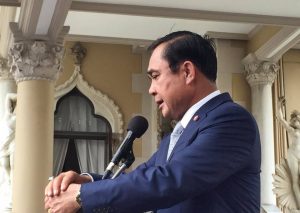As the Thai Prime Minister launches a new economic initiative, a lower valued Thai baht offers some foreigners living in Thailand with a boost in income.

The Thai Prime Minister Prayuth Chan-ocha this week, in a televised broadcast, said that the government was undertaking urgent measures to stimulate the Thai economy. The programme, akin to other successful measures in the past, will involve the provision of interest free loans and funding to tampons or sub districts throughout Thailand. The Prime Minister, said that he expected that this initiative would create more job opportunities and bring more income to Thai people across the country and that the government was responding to public demand.
Household debt in Thailand reaches new heights
This comes at a time when household debt levels in Thailand have shown an alarming increase since 2014. Economic commentators in Thailand have identified a sharp slowdown in the Thai economy in a similar pattern that is being seen throughout Asia and which has been linked to the flight of capital from the east to the west in recent years as well as the emerging signs of a slowdown in the Chinese economy, for a long time seen as an engine of growth for the region.
Thai baht hits a new low against the US dollar
This comes in a week where the Thai baht has seen another drop in value and has reached a six and half year low against the US dollar at over thirty six baht to the dollar. A senior economist at Standard Chartered Bank in Bangkok, Usara Wilaipich, identified the fall in the value of the baht as due to external factors and did not think that the fall had anything to do with events internally in Thailand.
This is a widely view as other currencies in the Asean region have shown sharp declines. The market now believes that the United States Central Bank might have a greater probability of increasing its interest rate this month following the US announcement that its unemployment rate has declined to 5.1% while average income per hour has also increased more than expected,’ said Chirathep Senivongs Na Ayudhya, a spokesman for the Bank of Thailand.
Interest rate in the USA now a key to economic prospects in Thailand
The reduction in the Thai baht and other Asian currencies is seen as very much linked to the expectation of the US Federal Reserve interest rate hike widely expected to occur in the coming months. Tim Leelahaphan, an economist at Maybank Kim Eng Securities in Thailand, told The Nation newspaper that the outflows from the region were due to the Federal Reserve interest hike and uncertainty about China particularly after the Shanghai and Hong Kong stock markets were closed for anniversary celebrations to mark the defeat of Japan by China in World War II. Mr Leelahaphan while indicating that the US non Farm payroll figure published last Friday was not as good as expected did point out that the overall unemployment rate in America continued to decline which was seen by the markets as a positive development but there is still uncertainty regarding the prospect of a US interest rate hike due this month.
Rise in US dollar against the Thai baht may continue
It is now widely believed that the trend of the US dollar to rise higher may continue for the next few quarters as money flows out of the region due to uncertainty seeking safe havens. Many foreigners in Thailand are experiencing a short term boost due to the rising dollar as many receive fund transfers in the world’s dominant currency and other foreign currencies have also tended to side against the Thai baht. However banks in Thailand are cautioning import companies to seek hedging facilities to deal with the surge in costs relating to foreign goods.
While Thailand is hoping that a lower valued baht will boost exports, this has yet to be seen but what is more certain is that the rising value of the US dollar may follow through to higher retail prices in Thailand but it is hoped that this will be somewhat limited to luxury goods.


















